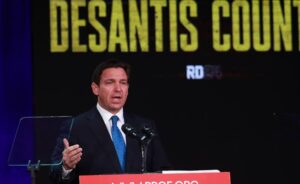Petition Madness: From Florida to Washington

Crazy or shady about politics in the state of Sunshine. Florida Playbook. Kimberly Lyonard’s briefing should be read. Today we will discuss about Petition Madness: From Florida to Washington
Petition Madness: From Florida to Washington
In recent years, the process of citizen petitions, ballot initiatives, and referenda has become a flashpoint in U.S. politics. States are increasingly wrestling with how to balance direct democracy — allowing voters to amend their constitutions or reject laws via petitions — against concerns about fraud, foreign influence, or administrative overload. Two states that exemplify very different approaches are Florida and Washington. The changes in Florida have stirred controversy, while Washington is tinkering with reforms with careful attention to precedent. This article traces the “petition madness” from Florida’s sweeping restrictions to Washington State’s legislative proposals, and explores what each says about democracy, citizen power, and the future of petition-driven lawmaking.
Florida: Stricter Rules, High Stakes

Background
Florida’s amendment/initiative petition system has been under heavy revision. HB 1205, passed by the Florida legislature and signed into law, imposes new and tighter restrictions on who can collect signatures, how quickly petition forms must be turned in, what penalties or bonds are required, and more. These changes come in the wake of pressure from the Governor and lawmakers who say the previous system was vulnerable to fraud or abuses.
Key Features of the New Law
Some of the more impactful (and controversial) measures in Florida’s reform include:
Residency and citizenship restrictions for circulators: Only U.S. citizens and Florida residents can gather or handle signed petitions. Non-residents and non-citizens are barred from collecting petition signatures in any official or signed manner.
Shortened timelines for submission: The return window for completed petition forms has been reduced from 30 days to 10 days.
Felony or fine penalties: Violations (such as using disallowed people to collect, submitting late, or mishandling signatures) come with serious fines or even felony liability. For example, a $50,000 fine is possible in some cases.
Bond requirements: One controversial feature is that petition sponsors may need to post large bonds (e.g. $1 million) before collecting signatures, as a guarantee that any fines or other costs will be covered.
Additional identity information from signers: Petition signers must provide more detailed personal information (e.g. driver’s license, state ID, or last four digits of SSN) beyond just name and address.
Legal Pushback & Court Decisions
These new laws have not passed without challenge. Advocacy groups, especially those working on issues like Medicaid expansion or marijuana legalization, argue that the restrictions constitute undue burdens on citizens’ rights of free speech, petition, and political participation.
A key development: a federal appeals court (Eleventh Circuit) recently allowed much of the Florida law (HB 1205) to take effect, overriding a lower court’s injunction with respect to certain provisions (citizenship/residency requirements, etc.). The majority held that Florida has a “substantial interest in preventing and investigating instances of voter fraud” and that the new restrictions are likely to be upheld as constitutional.
A dissenting opinion, however, argued that the laws reflect a pattern of suppressing voter access, especially among groups less likely to be U.S. citizens or long-term state residents. Critics warn that the new rules favor well-funded and established organizations, while making it harder for grassroots campaigns or marginalized voices.
Washington State: A More Measured Approach
While Florida has moved decisively to tighten rules, Washington State offers a contrast: reforms and oversight, but still working within templates of what has long been accepted in initiative law. Washington has a well‑entrenched system of initiatives and referenda, and its rules and statutes illustrate how a state with a tradition of citizen‑led measures operates under evolving pressures.
Basic Framework for Petitions, Initiatives & Referenda
Washington’s Secretary of State website and state statutes clearly lay out step‑by‑step how to sponsor an initiative or referenda. Some of the key features:
Only registered voters in Washington can sponsor or co-sponsor an initiative
There is a filing fee (about US$156 for statewide initiatives or referenda).
Proposals go through a review process (such as review by the Code Reviser, then the Attorney General, for wording, etc.).
Petitions must contain certain required text & warnings: the proposed measure, a concise ballot title, warnings about legal penalties for false signatures, etc.
There are thresholds for the number of signatures: for initiatives, it’s 8% of votes cast in last gubernatorial election; for referenda, 4%. Because signatures are often invalidated, sponsors are advised to collect significantly more than just the minimum.
Time deadlines: e.g., initiative petitions must be submitted several months before the election; referenda have deadlines tied to legislative session adjournment.
Proposed Reforms / Recent Bills
Washington has also been considering reforms to tighten up some parts of the initiative system, mostly focusing on signature gathering and the accuracy / verification of those signatures.
One of the more recent legislative proposals is SB 5382, a bill introduced in 2025 that would require:
Signature gatherers (volunteers or paid) to sign a declaration for each sheet of signatures, under penalty of false swearing. The declaration would affirm that signers provided true information, reviewed the petition, that the gatherer believes they are eligible, and that no compensation was promised for misleading people to sign.
Verification of residence address on the petition sheet matching the address in the voter registration record. This is aimed at ensuring less inaccuracy or fraudulent signatures.
These reforms are less sweeping than what Florida is implementing, but they reflect concern about fraud or petition abuse. They also illustrate Washington trying to preserve initiative power while policing process integrity.
Contrasting the Two: Key Differences & Common Ground
To understand how the “petition madness” is unfolding, it helps to contrast Florida’s approach with Washington’s: what they are doing differently, where they overlap, and what may be next.
| Feature | Florida (New Law: HB 1205, etc.) | Washington State (Existing + Proposed SB 5382, etc.) |
|---|---|---|
| Who can circulate / collect signatures | Must be U.S. citizens & Florida residents; non‑citizens and non‑residents banned. felony/fines possible for violations. | Anyone (registered voter) may be sponsor; signature gatherers may be paid; no citizenship/residency restrictions like Florida’s. Proposal SB 5382 asks for declarations but not banning non‑residents per se. |
| Timeline for submission | Shortened to 10 days for returning signed petitions; stricter deadlines. | Longer windows; statutes require initiative petitions submitted several months before election. |
| Penalties / Legal Risk | Severe: felony or large fines for violations; bond requirement; administrative sanctions. | Some penalties exist, e.g. for false swearing, forgery etc.; SB 5382 would clarify and reinforce those. But not as broad or harsh as Florida’s in many respects. wa-law.org+1 |
| Signature Requirements | Additional data required from signers (ID, address, etc.); stricter rules for submission. | Petitions must include name, address, city, county; warning statements; full text. Washington statutes are pretty clear on format. |
| Financial / Bond Requirements | Yes: bond requirement (≈ US$1 million in some cases) for sponsors; fines; administrative burdens. | No similar bond requirements currently; reform proposals focus more on signature gathering, verification, but not huge financial barriers so far. |
| Overall Scope of Reform | Wide: affecting multiple aspects (who collects, how, when, what penalties). Very strong tightening. | More incremental; more about clarity, process improvements, preserving existing rights while addressing fraud/mistakes. |
Implications: What This Means for Democracy & Participation
Barrier vs Protection
Supporters of the stricter laws argue they’re necessary: to protect against fraud, ensure the integrity of the ballot initiative process, prevent manipulation by groups or actors who may not have the community’s best interest at heart. In a time of intense political polarization, misinformation, and accusations of “signature harvesting” abuse, many states see these reforms as overdue. Florida’s government, for example, pointed to investigations and reported abuses in past petition cycles as justification.
Opponents, however, see danger: that such reforms shift from protecting democracy to restricting it — raising the cost (financial, administrative, legal) of citizen participation; excluding non‑citizens, recent residents, or marginalized groups; and consolidating power into well‑funded organizations that can navigate the legal/financial complexity. The concern is that the “petitions” become something only big money or large campaigns can afford, limiting genuine grassroots voices. Florida’s critics make precisely these arguments.
Legal Challenges & Constitutional Issues
Much of the tension leans on constitutional law: First Amendment rights (free speech, petition), equal protection, possibly due process. Courts will need to balance state interests (fraud prevention, administrative efficiency) against the risk of chilling legitimate political expression and participation.
Florida’s law is already being tested in courts. The fact that various elements have been allowed to go into effect does not settle all challenges. The dissenting opinions suggest that some restrictions may be struck down later. In Washington, reforms are more modest; likely less risk of wholesale overturning, though legal scrutiny remains — especially if statutes impose penalties or restrict who can collect signatures.
Political and Social Realities
Petition and initiative reforms tend to be aligned with broader political battles. In Florida, the recent changes came in part after citizens’ initiatives to protect abortion rights or legalize recreational marijuana (supporters argue that petitioners used the previous, more flexible regime). For lawmakers opposed, stricter rules offer a mechanism to slow, complicate, or block certain initiatives.
In Washington, where initiatives are common and have had success across both progressive and conservative issues, reforms have to contend with strong norms of citizen initiative power. Thus, changes tend to be incremental, less disruptive, often focused on process rather than outright control. People in Washington expect accessible initiative/referendum mechanisms; political culture and precedent make sweeping restrictions harder to pass or enforce without backlash.
Where “Petition Madness” May Head Next
Based on what is happening in Florida and Washington, here are some predictions and concerns about where things may go:
More States Adopting Florida‑style Restrictions
Given Florida’s example, it’s plausible that other states will follow suit: imposing stricter residency/citizenship requirements for circulators, limiting who can collect or handle petitions, increasing penalties, tightening deadlines, or requiring bonds. Such laws may be pitched as anti‑fraud but risk reducing participation.Legal Pushback and Judicial Clarification
Courts will be central. Cases will test where to draw the line between permissible regulation and unconstitutional burdens. Key questions: Are circulator restrictions constitutional under the First Amendment? At what point do signature submission deadlines or identity requirements make participation unreasonably difficult? Will bonds or fines be considered so onerous as to constitute barriers?Grassroots Campaigns Will Need Adaption
Smaller groups or citizen initiatives will need much more sophistication: legal advice, compliance oversight, funding for bonds or legal costs, ensuring circulator training, better tracking of deadlines. The cost of entry may rise.Technology, Verification & Fraud Prevention Tools
States might invest or require more tools: signature matching software, databases, stricter verification of voter registration, possibly digital tools or e‑petition systems (though those pose their own legal and logistical challenges). Washington’s reforms seem more anchored in improving accuracy (e.g. address matching, declarations) rather than sweeping bans.Public Awareness & Political Mobilization
These reforms are controversial. They may deepen public distrust if perceived as suppressing citizen voice. Advocacy groups will likely push back. Grassroots campaigns could highlight cases where petition thresholds or circulator bans stopped initiatives with popular support.Potential Compromise Measures
Given the constitutional constraints and political pressure, states may settle on intermediate reforms: for example, careful circulator declarations rather than outright bans, moderate fines rather than felony penalties, longer deadlines rather than extremely compressed ones, greater transparency rather than secrecy. Washington shows this possibility.
Lessons & Takeaways
Citizen petition power is a fragile instrument: It depends not just on laws on the books but on how restrictive or permissive the rules are, and on how easy or hard it is in practice to navigate them.
Regulation vs Restriction: There’s a fine line between regulating in the interest of integrity, and restricting so much that only well‑funded or established organizations can reasonably succeed.
Courts matter deeply: The constitution, especially First Amendment, plus equal protection or due process claims, will be critical in deciding what rules are allowed.
Equity concerns: Reforms must consider who is most affected. Non‑citizens, recent residents, people in poorer or rural areas may face much harder obstacles under stricter petition laws.
Process transparency and fairness: It’s not just what the rules are, but how they are enforced, how accessible training or information is, and whether deadlines, fees, and penalties are clearly known and applied evenly.
Conclusion
“Petition madness” captures the current tension: between democracy as inclusive participation, and democracy as rule‑bound, managed, and secure. Florida is leaning heavily toward the latter, with sweeping legal changes that tighten almost every aspect of the initiative/petition process. Washington, by contrast, is refining aspects of its process to better guard against mistakes or abuse, but with more concern for preserving access.
Which side will “win” in the courts, in public opinion, or in the lived reality of citizen participation remains an open question. But what is clear is that the rules of engagement for citizen‑led democracy are being rewritten — and they will shape not only what issues make it onto ballots, but who gets to have a voice in putting them there.
How useful was this post?
Click on a star to rate it!
Average rating 0 / 5. Vote count: 0
No votes so far! Be the first to rate this post.
About the Author
usa5911.com
Administrator
Hi, I’m Gurdeep Singh, a professional content writer from India with over 3 years of experience in the field. I specialize in covering U.S. politics, delivering timely and engaging content tailored specifically for an American audience. Along with my dedicated team, we track and report on all the latest political trends, news, and in-depth analysis shaping the United States today. Our goal is to provide clear, factual, and compelling content that keeps readers informed and engaged with the ever-changing political landscape.




